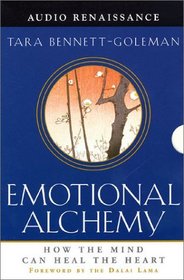Helpful Score: 4
(posters note: a very interesting read and definitely changed the way I look at emotion)
According to ancient legends, alchemists use a magical philosopher's stone to transmute lead into gold. In Emotional Alchemy, Tara Bennett-Goleman shows readers how they can use this alchemist metaphor to transform emotional confusion (lead) into insightful clarity (gold). And what does the magic stone represent? "Mindfulness," a lifelong practice that can bring readers more joy and contentment than the gold, according to Bennett-Goleman. "Mindfulness means seeing things as they are without trying to change them," she writes. "The point is to dissolve our reactions to disturbing emotions, being careful not to reject the emotion itself."
Those who have never entered this practice will find a concise and articulate teacher in Bennett-Goleman, who leads national workshops with her husband, author Daniel Goleman (Emotional Intelligence). What make this book such an exciting breakthrough is Bennett-Goleman's ability to apply Buddhist mindfulness to Western psychology. She shows how emotional alchemy can be used to address typical habits, such as mistrust, fear of rejection, feeling unlovable. Readers will also find fascinating scientific facts on how emotional alchemy affects brain chemistry and even cancer survival. --Gail Hudson --This text refers to an out of print or unavailable edition of this title.
According to ancient legends, alchemists use a magical philosopher's stone to transmute lead into gold. In Emotional Alchemy, Tara Bennett-Goleman shows readers how they can use this alchemist metaphor to transform emotional confusion (lead) into insightful clarity (gold). And what does the magic stone represent? "Mindfulness," a lifelong practice that can bring readers more joy and contentment than the gold, according to Bennett-Goleman. "Mindfulness means seeing things as they are without trying to change them," she writes. "The point is to dissolve our reactions to disturbing emotions, being careful not to reject the emotion itself."
Those who have never entered this practice will find a concise and articulate teacher in Bennett-Goleman, who leads national workshops with her husband, author Daniel Goleman (Emotional Intelligence). What make this book such an exciting breakthrough is Bennett-Goleman's ability to apply Buddhist mindfulness to Western psychology. She shows how emotional alchemy can be used to address typical habits, such as mistrust, fear of rejection, feeling unlovable. Readers will also find fascinating scientific facts on how emotional alchemy affects brain chemistry and even cancer survival. --Gail Hudson --This text refers to an out of print or unavailable edition of this title.




